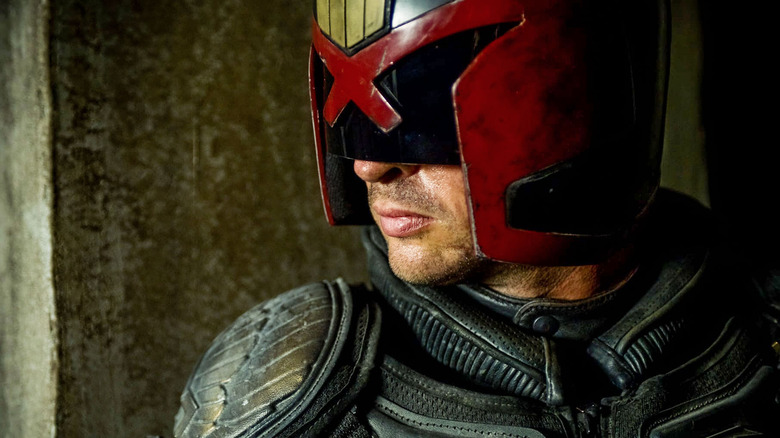
(Welcome to Tales from the Box Office, our column that examines box office miracles, disasters, and everything in between, as well as what we can learn from them.)
When a movie is initially released, it feels like its financial performance is the biggest measuring stick to determine its success. But we have countless examples of films that failed in their day only to become stone-cold classics that had a rich life well beyond their opening weekend. Let us never forget that "The Thing" and "Blade Runner" both had to open against "E.T." but they were not lost to the sands of time. But sometimes, the sting of failure cuts deeper because absolutely everything seemed right, and yet, it doesn't click with moviegoers. Such was the case with 2012's "Dredd," a movie so good that its relative disappointment still hurts a full decade later.
In honor of the film's 10th anniversary, we're going to look back at "Dredd," how it put together a dream team both in front of and behind the camera, what happened on its seemingly doomed opening weekend, and what lessons we can extract from it all these years later. Let's dig in, shall we?
The Movie: Dredd
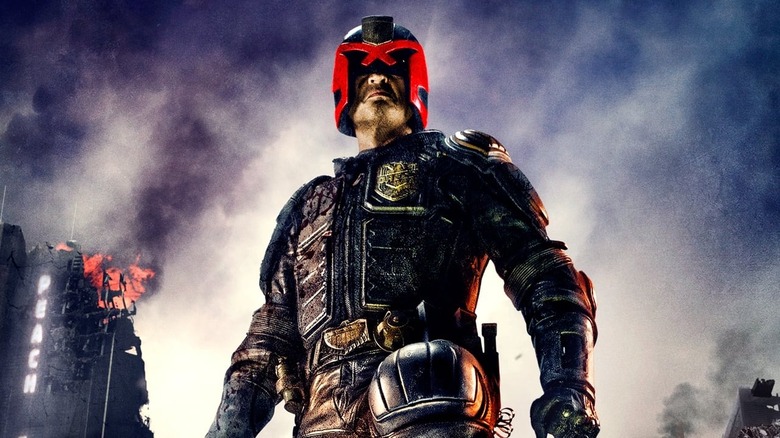
In the same year that "The Avengers" proved that the sky was the limit for superhero movies, the idea was hatched to take another crack at the "2000 AD" comics that inspired Sylvester Stallone's 1995 flop "Judge Dredd." But things were different this time around. For one, this iteration, simply titled "Dredd," was being produced for a reasonable $45 million, as opposed to the reported $90 million that was spent on Stallone's version. But the public still had that movie in mind, which is something that frustrated the comic's co-creator John Wagner, who served as a consultant on this film. In an interview with Empire, he emphasized that what they were doing was not a remake.
"It's not a remake: It's a proper-make. I'd say maybe 30 percent of American comic fans are aware of 2000 AD. That's a guess, but it certainly hasn't got the kind of profile it has over here. It's growing though. They're starting to put out a lot of compilations and 2000AD albums and Dredd face flannels. They're starting to sell fairly well."
Indeed, the universe of "2000 AD" has always been bigger in the U.K. than it has been in North America. Be that as it may, familiarity with the source material isn't a requirement for a mid-budget, R-rated adaptation of a comic book to succeed. Especially when Alex Garland, the man behind "28 Days Later" and (eventually) the Oscar-winning "Ex Machina" is the man adapting that source material. Pete Travis ("Vantage Point") ultimately wound up in the director's chair, though Duncan Jones ("Moon") was in consideration.
Good Company, Bad Timing
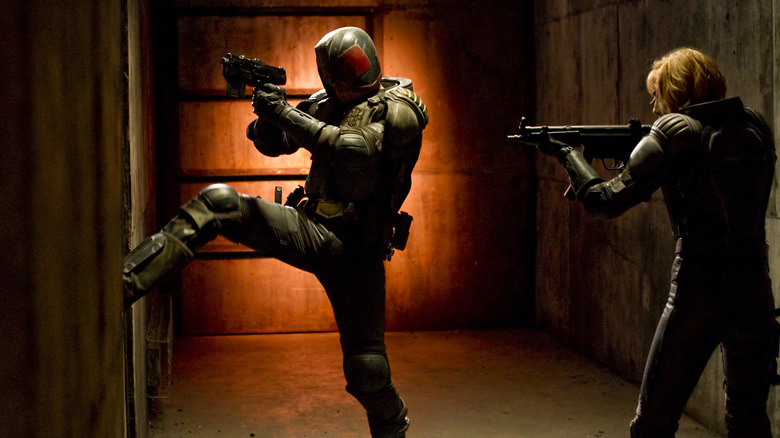
Karl Urban ("Star Trek") was ultimately cast in the lead role, and the man clearly had no ego about it. Judge Dredd keeps his helmet on the whole time, meaning there wasn't a lot of glory in face time with this one. The rest of the cast filled out nicely, with Lena Headey ("Game of Thrones") starring as the main villain - a drug kingpin at the top of a high rise in Mega City One that Dredd and his new partner, Anderson (Olivia Thirlby) are tasked with taking down. That simple plot allows the film to largely be contained to a single location, putting maximum focus on character and action.
All of the right pieces seemed to be in place. The problem? Timing did not appear to be on the movie's side. Even though DNA Pictures and Reliance Entertainment pre-sold $30 million worth of foreign of rights to the 3D picture, signaling a great deal of interest, the unfortunate arrival of one of the greatest action movies of all time got in the way. "The Raid: Redemption" made its way to the U.S. in early 2012 and comparisons were made between that film and "Dredd" well before its release. Indeed, the two films do have similar plot structures and, as the saying goes, if you ain't first, you're last. Garland was well aware of the similarities and, in that same Empire interview, addressed them head-on.
"I guess it's just unfortunate timing, and we'll see if it ends up mattering. At least what we've done though won't take away from the incredible achievements of that film. One thing that one can be aware of, having worked on a film with a very similar narrative, is that they've done something pretty extraordinary considering their resources. They've done something pretty extraordinary anyway! So all power to them."
Did it matter? Maybe. Maybe not. But things went poorly. Despite having an incredible movie produced for a reasonable budget with a stellar cast based on a known property that had yet to see its potential realized on screen, everything went wrong upon its release.
The Financial Journey
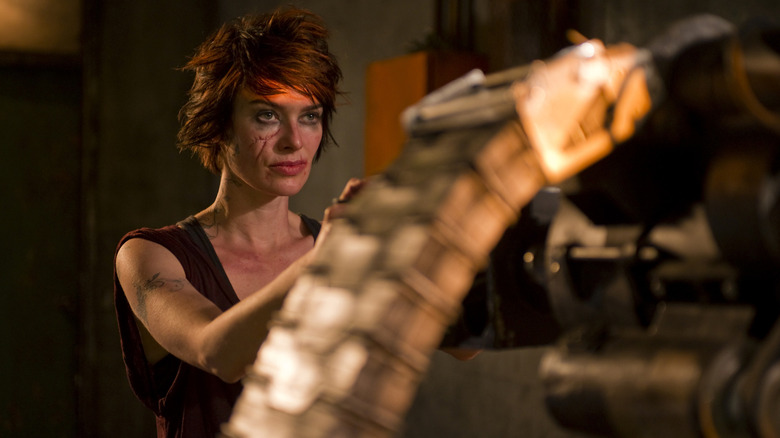
"Dredd" had various distributors in markets around the world but it was Lionsgate who landed the North American rights to the violent, buzzy comic book flick. And it's worth noting that the studio has historically done quite well with mid-budget films. So it seemed like a good fit. Be that as it may, opening weekend was nothing shy of a trainwreck. The film opened on September 7 in the U.K. and got off to a slow start, debuting at just $1.6 million. But when it opened in the U.S. a few weeks later on September 21, it was a catastrophe.
Opening against "End of Watch," "House at the End of the Street," and "Trouble with the Curve," "Dredd" debuted at number six on the charts with just $6.2 million. All due respect to the weekend's competition, but it's not as though this movie lost out to stone-cold classics. It even made less than Disney's re-release of "Finding Nemo," which was in its second weekend. "Resident Evil: Retribution" also made more in its second weekend, raking in $6.7. It was that bad.
At that point, the writing was on the wall. The movie fell out of the top ten the following weekend and that was that. It finished its run with a lowly $13.4 million domestic and $27.6 million internationally for a grand total of $41 million. It didn't even make its budget back in raw ticket sales, let alone factoring in marketing costs. A major disappointment, to say the very least of it.
The Lessons Contained Within
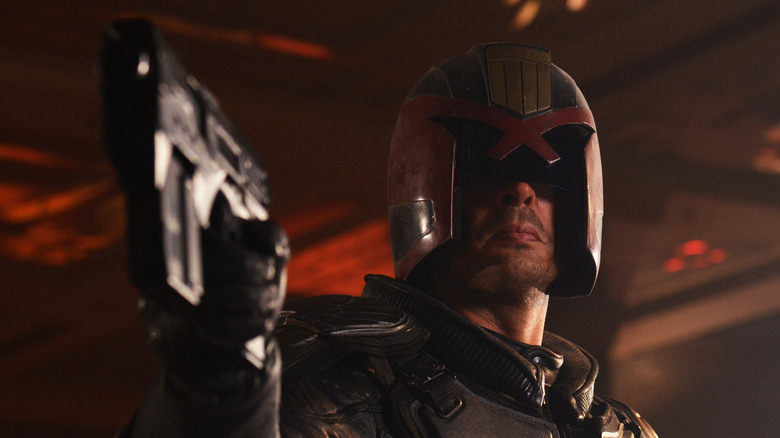
The two things I come across most in analyzing box office failures (which is something I do frequently) is that it either comes down to an inflated budget or putting the movie out at a terrible time. Sometimes both. In this case, I would argue that the producers kept the budget very reasonable for this type of movie and had every indicator that they weren't overextending. I would also argue that a late summer/early fall release made a lot of sense given the strong lack of direct competition in theaters at that time. The powers that be did not commit the biggest sins that can doom a film to fail.
So, what happened? Maybe we blame the marketing. Maybe we blame a lack of butts-in-seats movie stars. What we know for sure is that moviegoers didn't show up at the time and we never got a sequel because of it. Yet, Garland and Travis made an outstanding action movie that has truly found its audience in the year since its initial release. That hasn't necessarily been enough to make "Dredd" profitable but it indicates that nobody was wrong, it's just that things didn't go right. The movie gods didn't will it so.
My takeaway here is that the moviegoing public failed this one, plain and simple. It's not a helpful lesson and I don't like finger waving at people who like movies. But this is a damn good movie that was made responsibly with great filmmakers and a great cast. It should have worked and the people that caught it later wonder why it didn't spawn a franchise. The ultimate lesson? Vote with your dollars because it's the only thing Hollywood cares about at the end of the day. If something looks good to you, demonstrate that by laying down cold hard cash or the next "Dredd" could slip right through the cracks.
Read this next: Batman Movies Ranked From Worst To Best
The post Tales From The Box Office: The Financial Failure Of Dredd Remains A Tragedy appeared first on /Film.
0 Commentaires